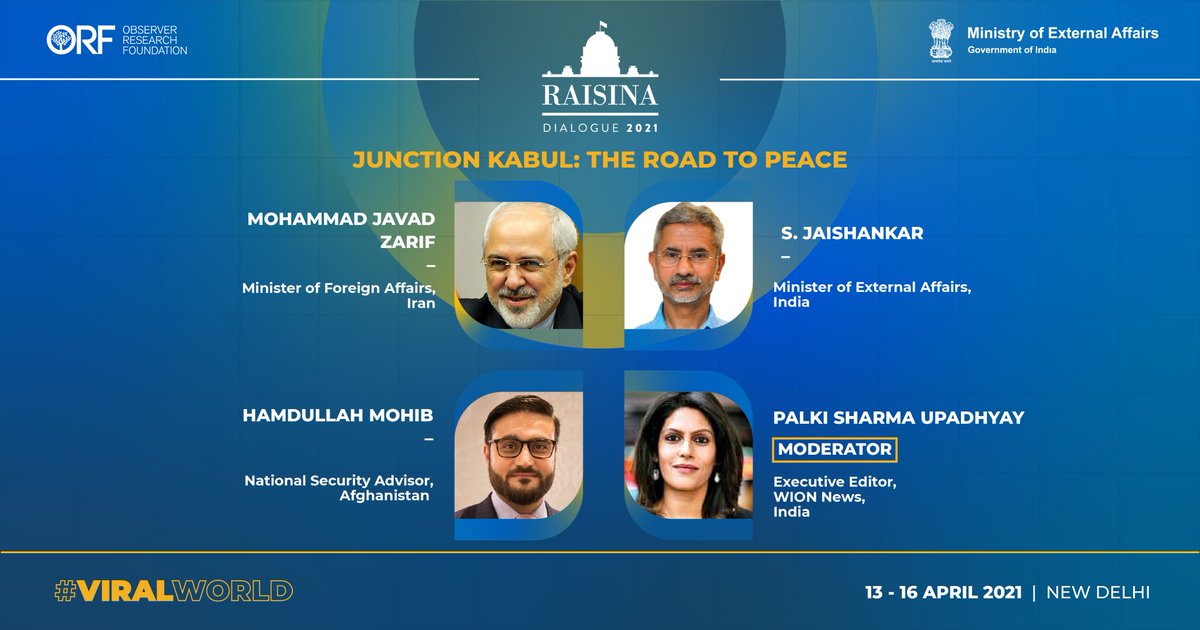
We are LIVE tweeting the discussion “Junction Kabul: The Road to Peace” with @hmohib, @JZarif, @DrSJaishankar and @palkisu”. Join us for an engaging discussion #Raisina2021 

.@hmohib: The new Biden plan to withdraw by Sept 2020 is a great opportunity for the Afghans to take control of the security situation in the country. Afghanistan does not need US combat troops on the group, it needs support for its armed forces #Raisina2021
.@hmohib: Its time for the Taliban to make peace with the Afghan govt. and become part of the mainstream Afghan society #Raisina2020
.@JZarif: Iran is prepared to provide any forum for the Taliban and any other groups including the govt. to engage in serious talks and move forward towards peace, without threats and violence #Raisina2021
.@JZarif: The committment of the US to finally withdraw from Afghanistan is a positive move. The Taliban should not use this opportunity to increase their violence. They should understand that the people of Afghanistan have had enough violence #Raisina2021
.@DrSJaishankar: The process must be Afghan-led and owned. This means that the outcome of the process should be in the collective interests of the Afghan people. #Raisina2021
.@DrSJaishankar: There is a strong Indo-Afghan friendship and goodwill for India. We will do whatever is in our power and interests by working with our neighbours to ensure that Afghanistan’s interests are protected #Raisina2021
@hmohib: The Taliban had a great opportunity after the #dohaagreement to be more tolerant and take it as an opportunity to lead their group forward. However, they began a narrative of victory, which was false and arrogant #Raisina2021
.@hmohib: President Ghani is probably the best person to lead the transition. When a majority of the US troops withdrew in 2014, he led that transition. We are creating a team to work with the US and NATO on their transition out of the country #Raisina2021
.@palkisu: Has the Taliban changed over the past 25 years? If yes, how have they changed? #Raisina2021
.@JZarif: The Taliban has to change based on democratic ways. If they want to go back to their 90s ideology, it will be impossible, as there is a new and different Afghansitan today #Raisina2021
.@JZarif: It is important for all Afghans to agree on what they want and then work on the details on how to create it. Regional countries should help Afghanistan create that picture, a #democratic govt., balanced ethnic representation, and a strong #economy #Raisina2021
.@DrSJaishankar: Afghanistan needs a double #peace - peace within the country and peace around the country. Afghanistan’s neighbours must contribute towards this #Raisina2021
.@hmohib: The #peace process must include all the different groups of the Taliban. No group or faction should or can be excluded #Raisina2021
.@hmohib: Everyone can be represented in the #democratic #republic of Afghanistan. The Taliban cannot believe that they will be able to force themselves on the people #Raisina2021
.@DrSJaishankar: It is an absolute fantasy that what India has done in Afghanistan is indirectly aimed at Pakistan, and saying so undermines India's efforts in Afghanistan #Raisina2021
.@JZarif: If we provide Afghanistan with transit opportunities through Chabahar to international markets, we will be able to build a viable public #economy that is not dependent on drugs or any other criminal activity #Raisina2021
.@JZarif: We need to put aside our differences and focus on our commonalities, incl. the fact that an Islamic emirate in Afghanistan is an existential threat to Pakistan and a #NationalSecurity threat to Iran and India #Raisina2021
.@DrSJaishankar: Afghanistan is a common enterprise of all its people. The fact that all faiths, ethnicities, minorities, women, and children are given space in Afghanistan shows the progress the country has made since 2001 #Raisina2021
.@JZarif: The role of #CivilSociety in Afghanistan today is not comparable to 2001 or the 1990s. While there are problems that remain in the country, we need to preserve what has been achieved in Afghanistan and ensure its continuity #Raisina2021
.@hmohib: #democracy is what brings us all together and provides an opportunity for a pluralistic society to function #Raisina2021
We come to the close of our discussion “Junction Kabul: The Road to Peace” with @hmohib, @JZarif, @DrSJaishankar and @palkisu. Thank you for joining us! #Raisina2021 #RaisinaDialogue
• • •
Missing some Tweet in this thread? You can try to
force a refresh






